Key takeaways:
- Inclusivity in discussions enhances engagement and requires active recognition of diverse perspectives and biases.
- Pro-life advocacy is anchored in the inherent value of life, compassion for mothers, and respect for personal autonomy.
- Inclusive practices in pro-life advocacy encourage understanding and collaboration, especially within marginalized communities.
- Building a supportive pro-life community involves sharing vulnerabilities, mentorship, and fostering collaborative partnerships between organizations.
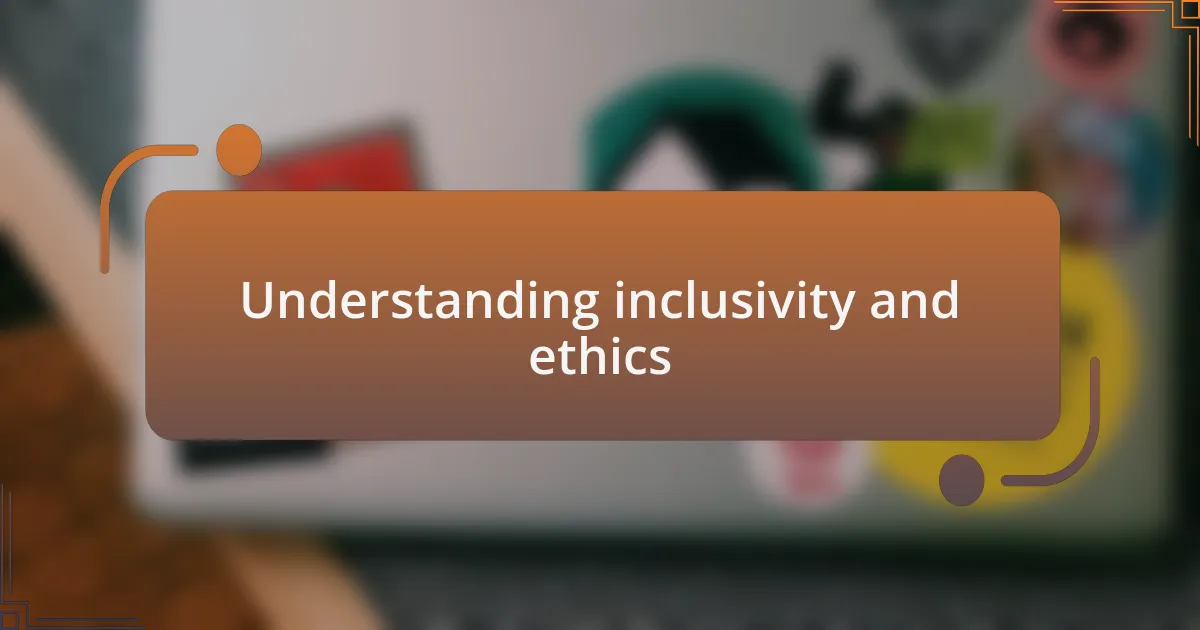
Understanding inclusivity and ethics
Inclusivity and ethics are intertwined concepts that shape how we engage with diverse perspectives. From my experience, I’ve noticed that creating a welcoming space requires us not just to accept differences but to actively embrace them. Have you ever found yourself in a discussion where your voice felt unheard? That feeling amplifies the importance of ensuring everyone has a seat at the table.
Ethics in inclusivity also demands a critical examination of our biases. I recall a time when I unintentionally overlooked someone’s opinion simply because it didn’t align with my views. This experience taught me that true inclusivity is about recognizing and valuing all voices, even those that challenge our beliefs. It raises the question: how often do we critically reflect on our own openness to others’ experiences?
Furthermore, inclusivity doesn’t just enrich our conversations; it also strengthens our ethical foundations. I’ve seen how diverse teams drive innovative solutions by fostering an environment where various viewpoints are not just heard but celebrated. This leads me to wonder, how can we better cultivate spaces that honor every individual’s story and perspective?
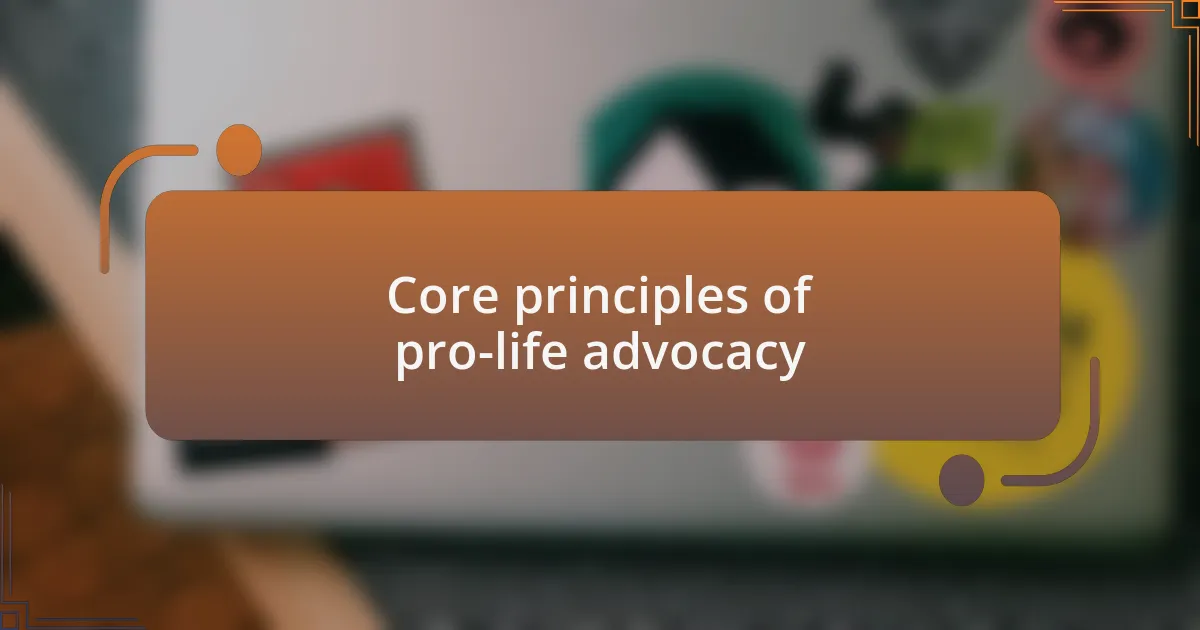
Core principles of pro-life advocacy
The core principles of pro-life advocacy revolve around the inherent value of every human life. I often reflect on the times when I’ve witnessed individuals passionately defending this belief, realizing how profoundly it resonates with some people’s personal journeys. This principle emphasizes that life, from conception to natural death, deserves protection and respect.
Another fundamental aspect is compassion for both the unborn and their mothers. I once attended a pro-life seminar where a mother shared her story of considering abortion, only to find support that changed her mind. Hearing her express gratitude for the love and resources she received reinforced my understanding that pro-life advocacy isn’t just about opposing abortion; it’s about walking alongside women, offering them hope and tangible help.
Respecting autonomy while advocating for life is also crucial. I’ve encountered challenging discussions where individuals assert their rights, raising questions about personal choice versus the preservation of life. Navigating this space requires sensitivity and an earnest commitment to dialogue, reminding us that listening is as vital as speaking out for life. How do we balance these perspectives in a way that uplifts and respects all involved?
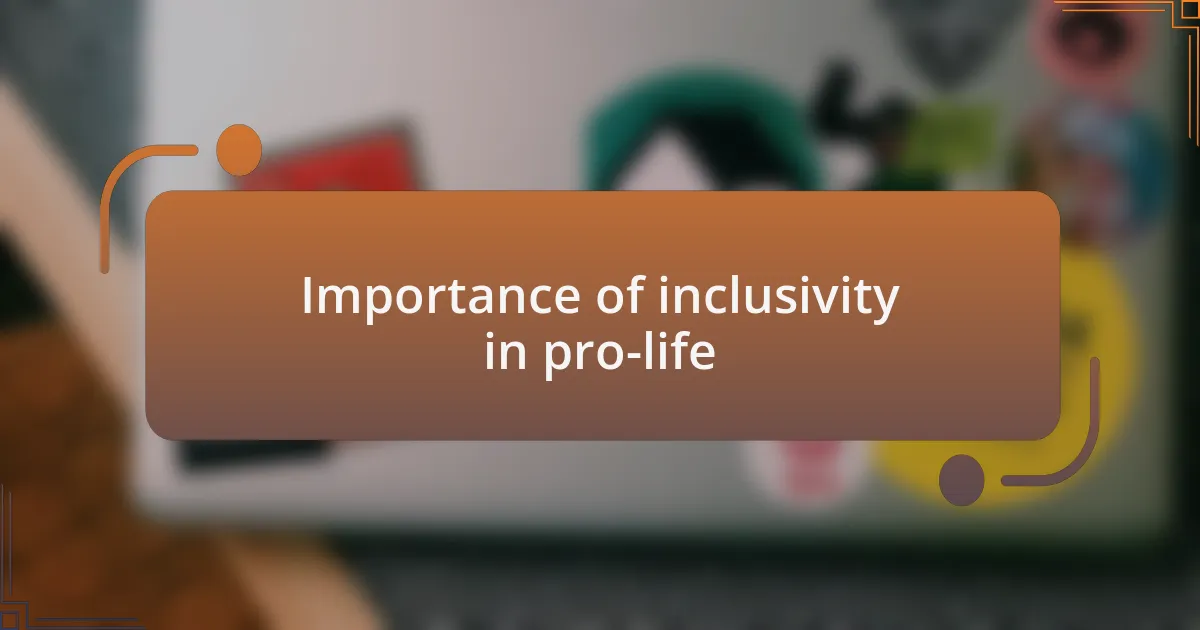
Importance of inclusivity in pro-life
Inclusivity plays a pivotal role in pro-life advocacy by ensuring that all voices are heard, particularly those of marginalized communities. I remember attending a local community event where a diverse group of individuals shared their experiences related to pregnancy and parenting. It struck me how different backgrounds brought unique perspectives, highlighting that the pro-life movement must encompass a range of experiences to truly advocate for every life.
I’ve often felt that inclusivity also fosters a deeper understanding of the complex emotions surrounding pregnancy decisions. One time, I spoke with a woman who had faced immense societal pressure during her pregnancy. Her candid reflections on feeling unheard made me realize that being inclusive isn’t just about adding voices; it’s about validating feelings and offering support without judgment. This realization underscores the need for a compassionate approach that respects the varied realities of women’s lives.
Moreover, embracing inclusivity encourages collaboration within the pro-life movement. I frequently consider the power of partnerships with organizations that serve underrepresented populations. When we join forces, the impact can be profound, as we create spaces where every individual feels valued and empowered to share their story. How can we ensure that these collaborations extend beyond rhetoric and lead to meaningful action? This question reminds me that inclusivity in pro-life work is not just beneficial; it is essential for authentic advocacy.
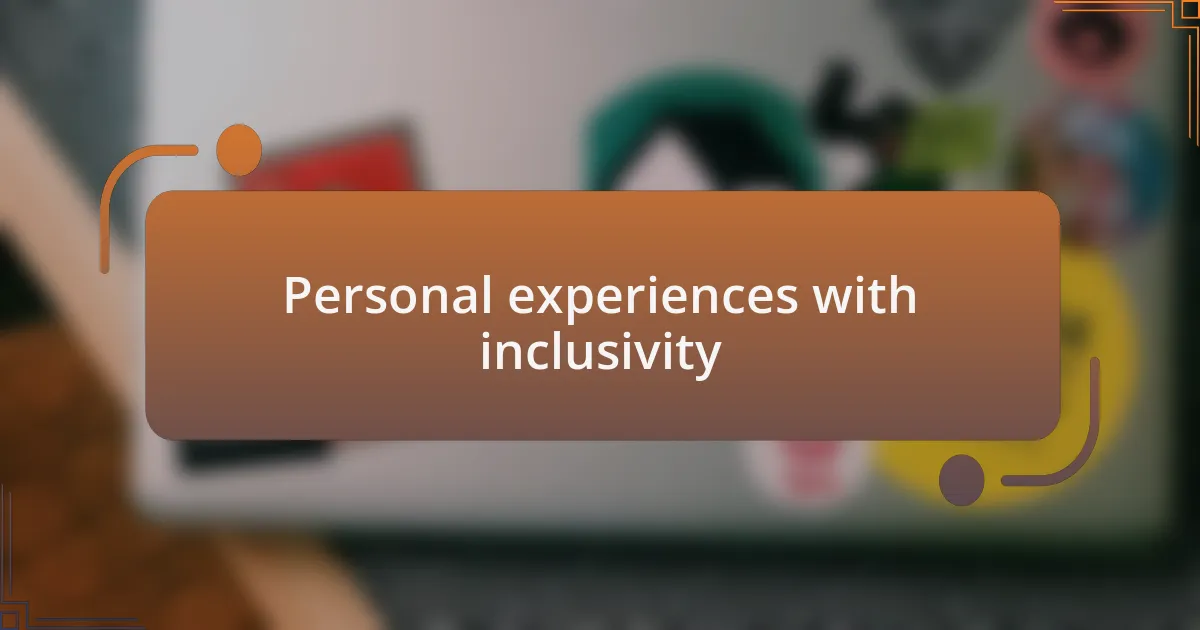
Personal experiences with inclusivity
In my experience, inclusivity isn’t just a theoretical concept; it’s a lived reality that shapes how we connect within the pro-life community. I recall a discussion I had with a young man whose sister faced a crisis pregnancy. He expressed feeling helpless and frustrated, highlighting how often family members can be overlooked in such conversations. This interaction reminded me that everyone involved deserves a voice, and their feelings matter, too.
Once, I participated in a roundtable discussion focused on racial disparities in maternal health. Listening to a mother share her struggle with inadequate support made my heart heavy. It hit me that her experience isn’t just her own; it represents many women who feel marginalized. How can we truly say we’re advocates for all lives if we aren’t addressing these critical issues?
Through these encounters, I learned the importance of weaving together various narratives. I once facilitated a workshop where participants from different backgrounds shared their stories around pregnancy. The room was filled with emotions, laughter, and even tears, creating a sense of unity. It’s moments like these that illustrate how inclusivity isn’t just beneficial; it enriches our collective mission and nurtures empathy among us.
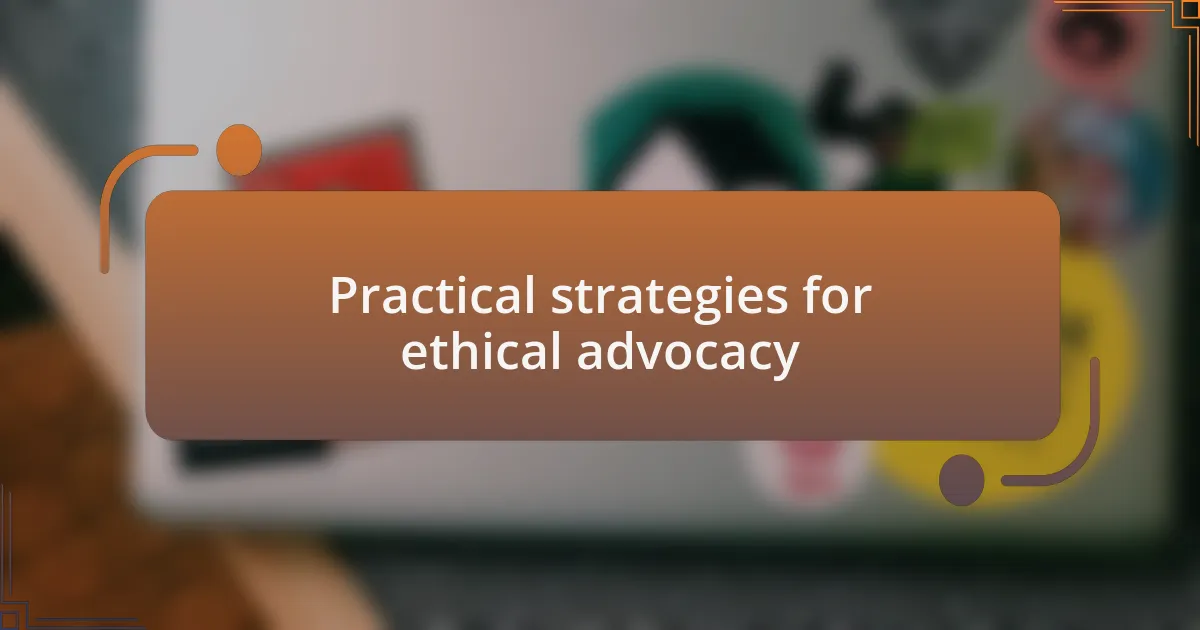
Practical strategies for ethical advocacy
One practical strategy for ethical advocacy is to prioritize listening over lecturing. In my own journey, I’ve found that engaging in one-on-one conversations with individuals from diverse backgrounds opens my eyes to perspectives I may not have considered. I remember a time when I spoke with a healthcare provider who shared their experiences with pregnant women in underserved communities. Their insights not only shaped my understanding but also reminded me that every advocate must first seek to understand before they can effectively contribute to the conversation.
Additionally, creating inclusive spaces for dialogue can foster authentic connections. In my experience, organizing community forums where people feel safe to voice their concerns has been incredibly impactful. I facilitated a session where participants were encouraged to share their stories—a young mother revealed how societal perceptions affected her journey. The depth of her vulnerability made me realize: how often do we forget the power of personal stories in shaping our advocacy?
Finally, reflecting on our language and tone in advocacy efforts is crucial. I vividly remember a moment during a public speaking event when I stumbled over certain terms that alienated some audience members. It struck me that ethical advocacy isn’t just about the message; it’s also about how we convey it. Are we really creating an environment where everyone feels welcome to engage when our language excludes others? By being mindful of our communication, we can ensure that our advocacy resonates with a broader audience.
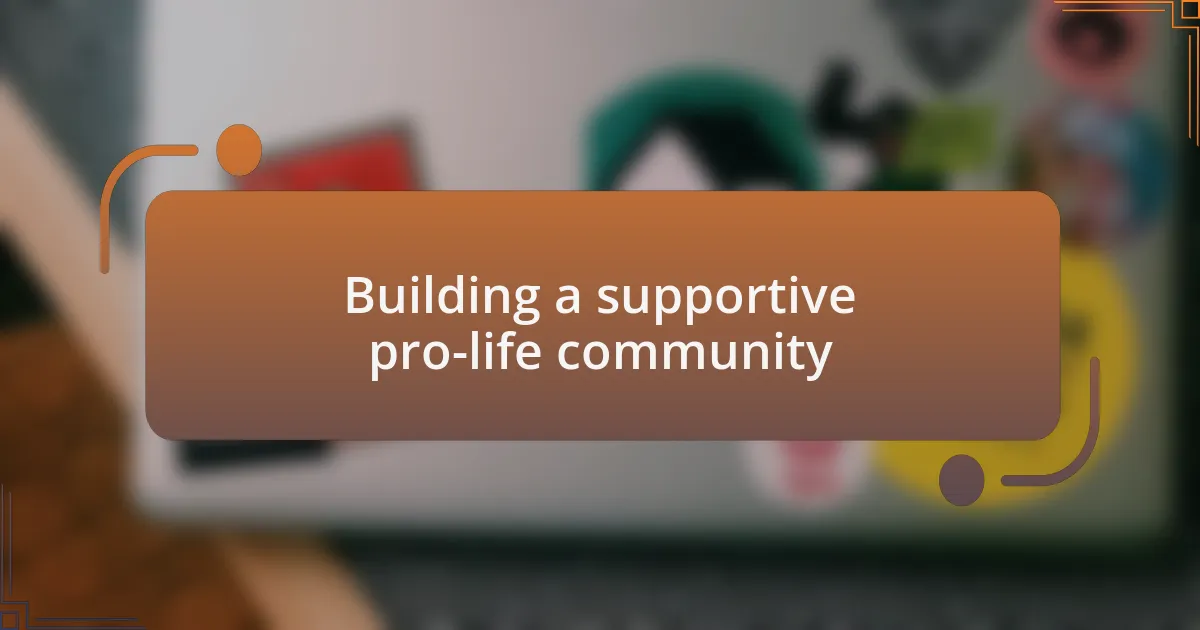
Building a supportive pro-life community
Building a supportive pro-life community necessitates embracing the diversity of experiences within it. Reflecting back on a local meeting I attended, I was struck by the raw honesty of a woman who had faced an unplanned pregnancy and felt overwhelmed by societal pressures. Her courage to share her journey inspired not just empathy but a commitment to foster a space where everyone’s story matters. Have you ever considered how the act of sharing our vulnerabilities can strengthen our community bonds?
Moreover, mentorship plays a pivotal role in nurturing a supportive environment. I’ve witnessed how pairing seasoned advocates with newcomers can ignite passion and provide valuable guidance. In one instance, a mentor helped a young advocate navigate tough conversations about her own beliefs, and I saw firsthand how this support transformed her into a confident voice within our community. Isn’t it fascinating how we can lift each other up through mentorship?
Creating pathways for collaboration among various pro-life organizations can also enhance our sense of belonging. I recall an event where different groups came together to co-host a workshop on pregnancy resources. As we pooled our strengths, it became evident that our shared purpose transcended individual differences. It’s moments like these that remind me: when we unite in our mission, our community not only grows but becomes a powerful force for change.